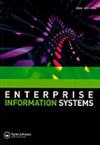智能自主网络物理系统及其应用
IF 3.9
4区 计算机科学
Q1 COMPUTER SCIENCE, INFORMATION SYSTEMS
引用次数: 0
摘要
本期特刊旨在介绍网络物理系统(CPS)及其应用的最新进展。CPS是一种新兴的范式,具有广泛的应用,如智能制造、智能电网、智能制造等。通常,CPS应用程序很复杂,通常很难在实时环境中构建和管理。目前,能源管理仍然是一个关键问题,尤其是在汽车行业。为了有效地处理智能调度系统中的能量优化问题,提出了一种多模糊强化能量调度方法(MFAESA),该方法结合模糊算法来处理能量损失问题。该算法搜索网络空闲时间,并优化物联网高效辅助汽车行业的能源使用。这增加了性能度量并减少了系统执行时间。此外,这种方法非常准确,并以更优化的方式保护整个物联网网络的能量损失。供应链管理是CPS最突出的应用之一。本期特刊还重点探讨CPS辅助供应链管理系统的最准确和容错解决方案。设备,包括目标硬件、软件和操作环境,在物联网系统中运行时更容易受到易受攻击的操作。基于线性近似的模糊模型用于识别供应链管理系统中的缺陷部件。最粗略近似技术的使用消除了故障部件识别中的缺陷,并消除了模糊性措施。此外,这种方法有助于测量系统动态模块中的故障。目前,跨物理网络的信息管理仍然是一个重大问题。尤其是网络安全辅助物联网系统。本特刊提供了一种基于深度强化学习的解决方案,用于处理企业信息管理及其与智能物理系统的集成。它效率很高本文章由计算机程序翻译,如有差异,请以英文原文为准。
Intelligent autonomous cyber-physical systems and applications
This special issue aims to bring out recent advances in cyber-physical systems (CPS) and its applications. CPS is a new emerging paradigm with widespread applications such as intelligent manufacturing, smart grid, smart manufacturing, etc. Usually, CPS applications are complex, and it is often difficult to build and manage in a real-time environment. Currently, energy management remains to be a critical issue, especially with automobile industries. To effectively deal with energy optimisation problems across smart scheduling systems, a Multiple Fuzzy Aggravated Energy Scheduling Approach (MFAESA) is proposed to incorporate fuzzy algorithms to deal with energy loss problems. This algorithm searches for the network idle time and optimises the energy usage of IoT efficiently assisted automobile industries. This increases performance measures and reduces system execution time. Further, this approach is highly accurate and protects energy loss across the IoT network in a more optimised way. Supply chain management is one of the most prominent applications of CPS. This special issue also focuses on exploring the most accurate and fault-tolerant solutions for CPS assisted supply chain management systems. Devices, including target hardware, software, and operating environment, are more susceptible to vulnerable operations when functioning across the IoT systems. A linear approximation based fuzzy model is used to identify defective components in the supply chain management systems. The use of roughest approximation techniques eliminates the defects in the identification of faulty components and eliminates ambiguity measures. In addition, this approach helps to measure faults across the dynamic modules of the system. Currently, information management across physical networks remains to be a significant issue. Especially with cybersecurity assisted IoT systems. This special issue presents a deep reinforcement learning-based solution to deal with enterprise information management and its integration with intelligent physical systems. It efficiently
求助全文
通过发布文献求助,成功后即可免费获取论文全文。
去求助
来源期刊

Enterprise Information Systems
工程技术-计算机:信息系统
CiteScore
11.00
自引率
6.80%
发文量
24
审稿时长
6 months
期刊介绍:
Enterprise Information Systems (EIS) focusses on both the technical and applications aspects of EIS technology, and the complex and cross-disciplinary problems of enterprise integration that arise in integrating extended enterprises in a contemporary global supply chain environment. Techniques developed in mathematical science, computer science, manufacturing engineering, and operations management used in the design or operation of EIS will also be considered.
 求助内容:
求助内容: 应助结果提醒方式:
应助结果提醒方式:


